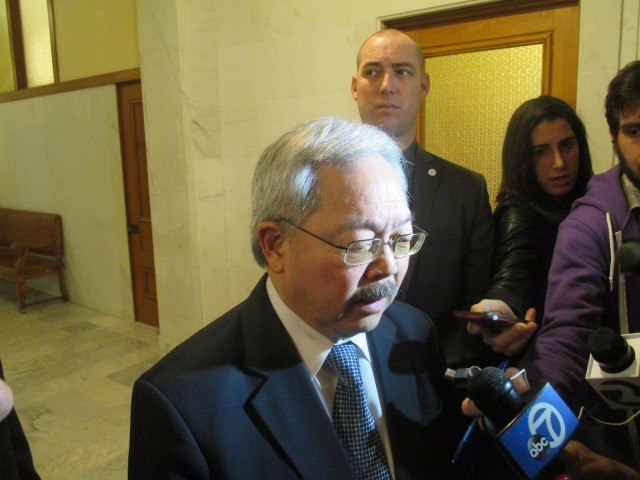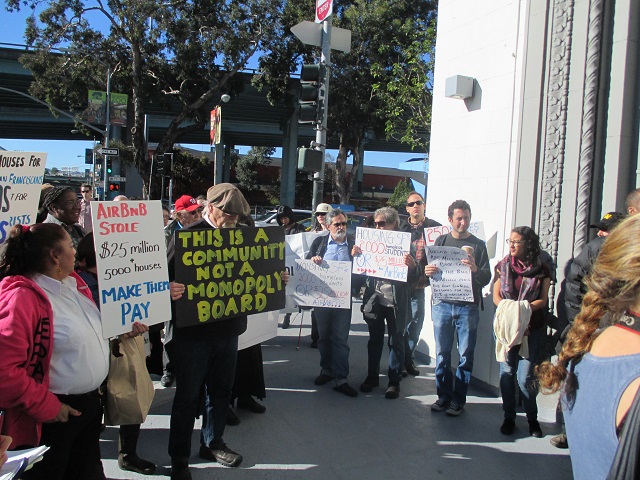Mayor Ed Lee stopped by the Chronicle last week for an Editorial Board meeting, and since he didn’t have an effective answer for why there have been so many car break-ins and house burglaries in the city of late (um, radical income inequality tends to lead to these sorts of crimes), he blamed the judges.
The Chron’s story quoted a couple of people saying that was a bad approach, but it’s remarkable how little attention his comments have gotten. Because, as Joe Eskenazi points out in SF Magazine, what the mayor suggested is really pretty terrible.

He wants the insurance industry to fund a group to show up in courtrooms and “pressure” judges – the same way, I guess, the Airbnb and other corporate entities fund groups that go to City Hall to pressure the supes.
But courtrooms are a bit different. From Eskenazi:
There is so much wrong with Lee’s statements and so much wrongheadedness behind them, it’s important to unpack them here. The mayor, now more than ever, seems exceptionally confused. He’s certainly confusing.
Let’s start with procedure: A court of law is not a daytime talk show. It’s not even a Board of Supervisors meeting. You can’t just show up and tell the judge what you think about the facts and law of a case you aren’t involved in, let alone “testify” in any way. “In all my years sitting on the criminal court, I don’t think I’ve ever had a member of the public saying, ‘I wanna testify,’” says [retied Judge Harry] Low. “If you’re the victim or you have a specific interest in the case, you might be able to comment. But not testimony.” Presenting matters regarding a defendant’s criminal history is, naturally, the job of the prosecuting attorney and/or the probation officer, Low continued. When asked why Lee, a civil rights attorney, wouldn’t know this, Low replied “his practice was rather limited.”
But the truly disturbing elements of Lee’s suggestion go deeper than its unworkability. Rather, it’s the notion that the mayor seems to believe that citizens, underwritten by insurance companies, should be pressuring judges into making their decisions, not based upon the facts of individual cases, but due to concerns about electability. This gets to the underlying problems with electing judges in the first place. But to call for a crass exploitation of this dynamic—by activists funded by business interests no less—is insidious. …
Finally, regarding the true culprits of the property crime surge itself, let’s take a step back and look at some statistics. While Lee seems to be scapegoating bleeding-heart judges, it warrants mentioning that, through the first eight months of 2015, only around 3 of every 50 property crimes reported in San Francisco resulted in an arrest and a suspect being presented to the District Attorney for charging. Much of this city’s property crime is highly visible car break-ins; 25,813 were reported in 2015 alone. But only 487 cases were eventually presented by the police to the DA (1.9 percent). Let’s state that again: Of the more than 25,000 car break-ins last year, less than two percent of the cases ended up with arrests that made it to the DA’s desk (around 80 percent of these cases were charged). Those are paltry numbers for a city experiencing a crime wave.
I’m all for electing judges – the appointments process is also really political and subject to the same kinds of influence; in fact, often it’s worse – but does the mayor really understand what he’s calling for? An insurance-industry-funded group trying to force judges to put more poor people in jail for stealing car radios? Is that really a serious criminal-justice solution?
In fact, most of the modern progressive law-enforcement types, including our current district attorney, are trying to find ways to keep small-time offenders OUT of jail, and the trend even in some more conservative circles is against harsh crackdowns on people who commit nonviolent crimes.
The mayor’s deputy chief of staff and criminal justice advisor, Paul Henderson, is running for judge. What does he think of this? Did Lee discuss it with him in advance? Is this how he wants to be seen as a candidate — the guy whose boss wants to lock up the mostly low-income folks who do these kinds of crimes? (Haven’t heard back from him yet, but I know it’s a holiday weekend, will update when I do.)
The other two candidates were pretty clear that this is a bad idea. “I don’t support having insurance companies fund citizen groups to pressure judges,” Victor Hwang told me. Notes Sigrid Irias: “The California Code of Judicial Ethics requires in part that a judge ‘shall be faithful to the law regardless of partisan interests, public clamor, or fear of criticism.’ Any person who appears in court is entitled to a judge who is free from bias, and independent of political or popular pressure.”
What, exactly, is going on in the Mayor’s Office these days?
Eileen Hansen, a stalwart progressive leader and inspiration and friend to so many, died April 29, and we all miss her. The community will get together to celebrate and honor he life Wednesday/8 at the Unitarian Church on Franklin Street. 5pm to 7pm. See you there.
The Planning Department staff is recommending that the commission approve Thursday/2 a plan that would create new mostly expensive housing on Potrero Hill – and in the process displace 6,000 square feet of industrial space (now used for motorcycle repair) and block the light coming into the cupola of a modest church that has become internationally famous for … the light that comes in through the cupola.
St. Gregory of Nyssa Episcopal Church isn’t one of those giant cathedrals that become landmarks, but it’s got some amazing architecture. It was designed to allow beams of light to fall on the altar, and the visuals are stunning.
The developer’s original plan would have almost entirely blocked the light, which people come from all over the world to see. The plan has been somewhat modified – but it would still kick out rapidly vanishing PDR space and cut into the light that makes this little building such a gem in a city that doesn’t seem to care about that any more.
And for what? Sixteen luxury condos in a city that doesn’t need any more luxury condos.
The supes will start discussion a new set of regulations for Airbnb and other short-term rental sites Thursday/2 when the Government Audit and Oversight Committee takes up legislation by Sups. David Campos and Aaron Peskin that would impose the most reasonable of rules: The sites would be barred from listing illegal units.
Everyone, even Airbnb, admits that some of the places being rented out on the platform are in violation of existing city law (which Airbnb’s representatives helped write.) And even city planners say that they can’t enforce the law.
If you want to rent out a room in your house, or your whole house or apartment, there are legal ways to do it. You just have to register with the city and get a permit number. (The city wants to be sure that you actually live in the place, and aren’t buying rental housing, evicting all the tenants, and turning it into hotel rooms.)
So what’s wrong with the idea of telling all the hosting platforms (and Airbnb is the biggest, but not the only one) that they have to make sure a unit has a legal registration number before it can be advertised?
Campos tried to make that part of the original law, but lost 6-5; back then, David Chiu, who is now in the Assembly, was the D3 supervisor and the sponsor of the Airbnb law. Today, Peskin has that seat, and is a sponsor of the new legislation.
So there are probably six votes. It’s an election year, so maybe more. But it would take eight to override a mayoral veto.
Here’s what Airbnb and its allies are saying: Gee, it’s so hard to register that we should let people break the law for a while because they won’t be bothered filling out the forms. And gee, why should the company be responsible for enforcing the law?
One Airbnb ally even told me that this is the “privatization of law enforcement.”
So let’s look at that for a second.
My son is 17. If he walks into a bar in San Francisco and orders a drink, it’s the responsibility of the bartender – an employee of a private-sector business – to make sure he’s of legal age. A responsible business asks him for proof – for a legit ID. If he gets a drink without proving he’s old enough, he gets in a little trouble – but the bar owner gets in a lot of trouble, and can be shut down.
Is that “privatizing law enforcement?” Be serious.
A hassle to comply with the law? I’m sure it does, indeed, take a while to register to turn your home into a hotel. I’m sure the system could be improved.
For years, when I first arrived in SF, the California Department of Motor Vehicles was considered the worst bureaucratic nightmare in the civilized world; it took two or three hours in line to get to talk to a human being, who often said you had filled out the wrong form and you had to start all over again. It was the bane of every driver’s existence.
Did anyone argue back then that people should be allowed to drive without a license or in an unregistered car for a few months because the registration process was a pain?
It’s way better now at the DMV. The short-term rental registration will get better, too.
I am also told that Airbnb is “just a platform” and that it can’t be responsible for the actions of the people who use it. The city, this argument goes, should focus on the hosts who are breaking the law, not on the $25 billion corporation that allows them to do it.
I’m thinking: Maybe someone should start “Meth-bnb” or “Crack-bnb,” and connect people who have house trailers or empty warehouse space with rogue chemists who want a place to cook up their shit. (Then they could use “Meth-residue-disposal-rideshare” to connect with truck owners willing to haul the truly nasty toxic waste out into some low-income neighborhood or environmentally sensitive wetlands and dump it.)
How about “Stolen-bike-bnb” that connects the crooks who just broke your lock and took your bicycle with a chop shop that can cut it up into pieces and resell it?
How long do you think the city would put up with that?
We have decided, here in San Francisco, that it’s okay for people to rent out spare rooms to tourists, and rent out their homes to tourists, under some conditions and for limited periods of time. That, in some cases, helps people keep their homes and make some extra money while they’re on vacation.
Fine. All Campos and Peskin are asking is that the handful of people making very, very big money, billions of dollars, as the middlemen in this transaction make sure that they aren’t allowing unscrupulous actors to break the law.
I don’t see how even Airbnb supporters can be against that.
Don’t forget that 48hills is a cosponsor of the movie Killing them Safely, a documentary about Tasers. It shows Tuesday/31 at the Roxie. Information and tickets available here.
It could not be more timely: The San Francisco Police Commission will be discussing the department’s Use of Force policy – including Tasers – at its meetings Wednesday/1, Wednesday/8 and Wednesday/15.
The Other Barrio, a wonderful movie that takes on gentrification in San Francisco in a Noir setting, is showing in Oakland, at the New Parkway Theater. If you missed your chance to see it in SF, you have two opportunities to check it out: Wednesday/1 and Wednesday/15. It’s only 10 bucks, and you can buy tickets here.




